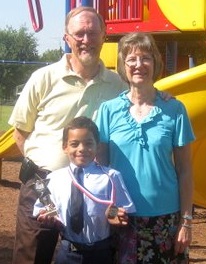Professional Education Courses: Through the Eyes of a Course Taker
Written by Sandie Barrie Blackley, MA/CCC
Published on July 10, 2013
 Lexercise has a suite of online tools for practitioners of Orton-Gillingham(O-G) /structu
Lexercise has a suite of online tools for practitioners of Orton-Gillingham(O-G) /structu
In today’s blog post, I interviewed Sara Jones (pictured with her husband and grandson) who is taking Lexercise Professional Education Courses this summer.
What is it like taking Lexercise Professional Courses?
Sandie Barrie Blackley: Tell us a little about yourself and what motivated you to pursue more training in the area of language-literacy intervention.
Sara Jones: I am a 7th grade special education inclusion teacher at our public middle school. Prior to that, I was an elementary teacher in private schools for 14 years. I have had no formal training in working with special education students, but only on-the-job training. I spent several years teaching kindergarten and first grade where teaching reading was of primary importance. I have five girls who are grown and now I am raising my grandson who has a reading disability. He is going into 4th grade and still only reads on a 1st grade level. He is my motivation for taking these two courses this summer. I also thought I might find help with knowing how to help my struggling readers in 7th grade.
SB: We’re interested in making the online format for courses as effective as possible. We’d like to hear your perspectives both on what has worked well for you and what suggestions you have for making the courses more effective. Would you tell us the 3 things you like best about your experience with the Lexercise online courses and 3 suggestions you have for how they could work even better?
SJ: I have enjoyed the first course. It was a good review of some things, but there were things in the course with which I was not familiar. I have always been told that English is the hardest language to learn. This course helped me to understand that it doesn’t have to be hard if you teach the 44 phonemes, and then begin teaching morphemes, both in a systematic manner. The syntax unit was also very interesting to me. I have never really thought in depth about how sentences have a definite structure, at least not in the way it was presented in the textbook for the course. Another interesting thing to note is that students might only have time to learn fewer than 400 new vocabulary words all year. This made me think that when I help my students with content vocabulary, I need to make it count.
SB: Do you have any suggestions about how we could improve the course?
SJ: I really cannot come up with any suggestions for improvement.
SB: Can you name a few new things you have learned in Course 1 (The Structure of Written English) that you think will be most helpful to you provide more effective intervention?
SJ: I would definitely like to try using the ideas presented in the resources that have to do with teaching morphemes. I hope I can pick out some content vocabulary to make discoveries about its etymology. I would like to use the real spelling website. I also liked the graphic organizers created to help with different kinds of writing. I was able to print these to put in a notebook for future use.
SB: How has the online format worked for you?
SJ: The online format has been great. I was able to work on the course when it was convenient for me. Even the technology part wasn’t bad. I am not as tech-savvy as many other people are.
SB: Has the instructor been helpful when you had questions?
SJ: The instructor has been great. She always answered my questions and gave me more resources to look at when I had questions or comments.
SB: What are you looking forward to about Course 2?
SJ: Course 2 was what I really wanted to get to. It is more the how-to, I think. I thought about trying to test out of course 1, but I’m glad I didn’t try because there were things in it that I was not familiar with even with my background of teaching reading using phonics.
SB: What would you say to people considering taking Lexercise’s Professional Education Courses?
SJ: If you are a reading teacher or a teacher who teaches reading, this is a very informative and helpful course. I wish I had learned these things years ago. I might have been able to be more helpful to those students who came through my class who struggled to read.
Thanks so much for sharing your experience with us, Sara! We are always happy to hear positive feedback about our courses.
We encourage you to contact us if you are interested in learning more about becoming a Lexercise Clinician. To learn more, click here.
Improve Your Child’s Reading
Learn more about Lexercise today.
Schedule a FREE
15-minute consultation



Leave a comment